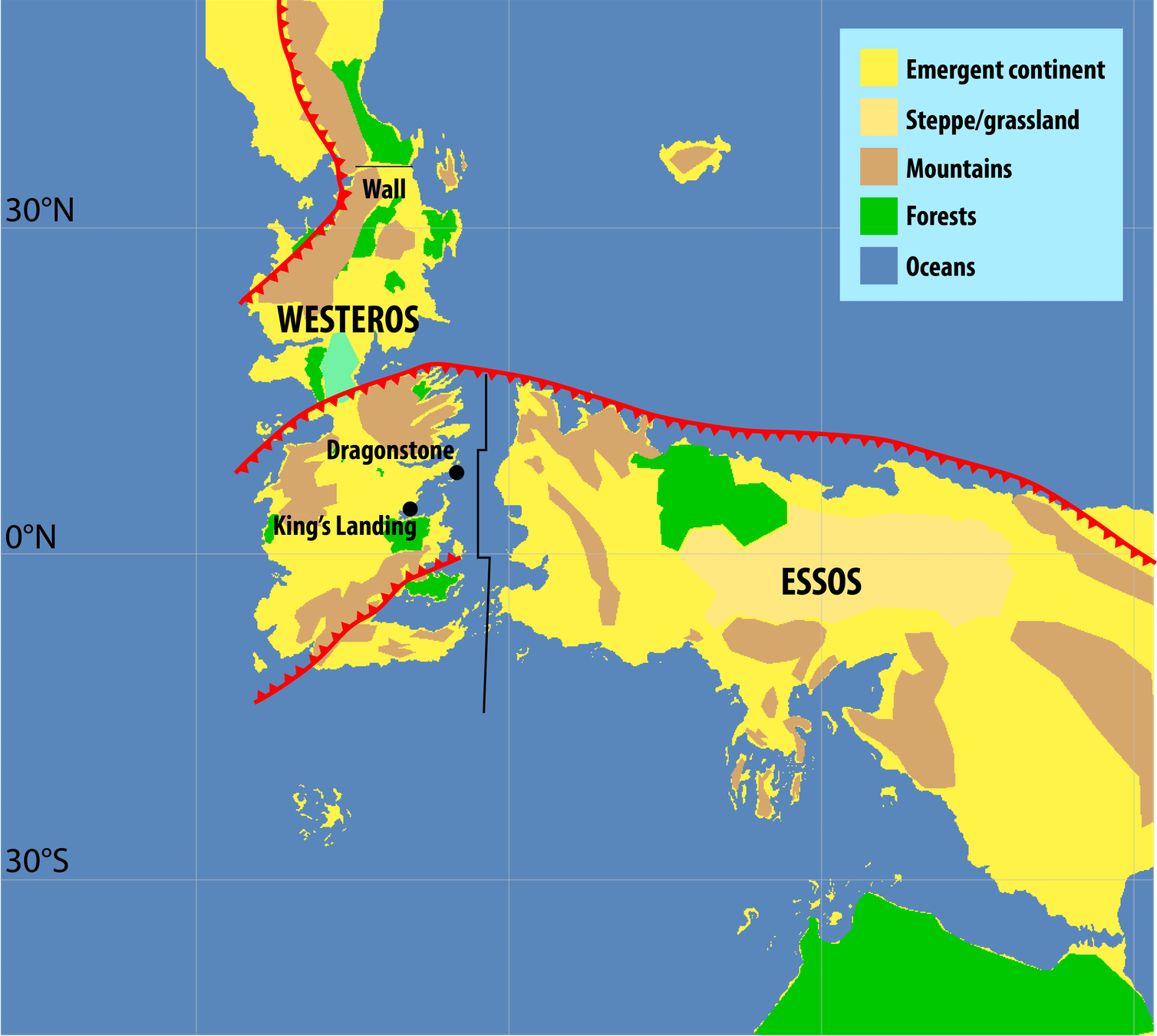We Made a Moving Tectonic Map of the Game of Thrones Landscape
This is pretty amazing.
Scientists are among the millions of die-hard Game of Thrones fans digesting the show’s finale today.
The striking landscape of Game of Thrones has led some researchers to build climate simulations that explain the erratic seasons depicted in the show, and others to piece together the geological history.
Inspired by this work, we have built the first plate tectonic reconstruction of the Game of Thrones continents. Tectonic plates are moving slabs that make up the outer layer of our planet, and behave like conveyor belts in the way they carry and drag continents around on the surface.
Even in this fantasy Game of Thrones world, geological processes like tectonic plate movement, earthquakes and volcanic eruptions would have been responsible for building the mountains, carving the rivers and creating vast oceans.
Why solve tectonic ‘jigsaw puzzles’?
Firstly, because even scientists are allowed a bit of fun now and then. But we also hope this map will help people better understand the science of plate tectonics, which is key to us knowing our past, present and even future world.
Plate tectonics can help us contextualise climate change and, like in the Game of Thrones world, geological events can influence political and social history.
We built the tectonic maps using free community software, called GPlates, that we developed for real-world tectonic modelling in the School of Geosciences at the University of Sydney.
The animation first shows our model for Westeros and Essos, but also how we use the same technology to build a detailed representation of Earth’s tectonic evolution. The same technology is also used by hobbyist “planet builders” who create evolving maps that might be used in computer games, movies and TV shows, or other creative pursuits.
Setting the scene
There is no doubt high-budget visual effects, a gripping storyline and power-plays between characters are key ingredients to the success of Game of Thrones. But so too are the captivating geological settings of the Seven Kingdoms.
The breathtaking cinematography across sweeping grasslands of the Dothraki steppe to the snow-capped volcanic peaks north of the Wall; each location depicting contrasting topography that has shaped vastly different societies.
The geology also informs the storyline. For example, the all-important Dragonglass (volcanic obsidian rock) and Valyrian steel is extracted from the volcanic cliffs around Dragonstone castle.
How we made our map
In our day-to-day work we use the shapes of continents and the geology they carry to reconstruct how real tectonic plate “puzzle pieces” moved around on Earth over time.
In this project, we worked with “evidence” collected by us and others from the Game of Thrones fictional world. This included evidence of past volcanism and mountain building, which are often the smoking gun for tectonic plate convergence and collision.

The easiest part of the tectonic reconstruction takes place by working backwards from seafloor spreading, where continents have been ripped apart by the the churning interior of our planet.
In the case of the Games of Thrones world, we’ve assumed the continents of Westeros and Essos broke apart 25 million years ago to open the Narrow Sea. We mapped this occurring much like the unzipping of the African continent along the East African Rift Valley at a similar time.
But as we go deeper in time, we lose a lot of geological evidence. This happens because of erosion, continental collisions that build mountains and subduction, where one tectonic plate sinks beneath another.
In the real world, although India is now part of the Eurasian continent, an ancient seaway called the Tethys once separated them before the continents collided about 45 million years ago. The continental collision uplifted the Tibetan Plateau and the Himalayas, and in the process crushing and destroying geological evidence and obscuring accurate tectonic models of the region.
Our plate tectonic reconstructions back to the Pangea supercontinent at 250 million years ago are fairly accurate by just undoing seafloor spreading, but the restoration of older supercontinents are much more difficult.
Knowing our planet
Tectonic plate “jigsaw puzzles” models are vital for explaining the evolution and liveability of our planet.
Plate tectonics controls the arrangement of continents and seaways on geological timescales, rearranging ocean circulation and altering global climate.
Although much of this geological activity is too slow to be perceptible by humans, the geological past is littered with examples where sudden geological “shocks” to the living creatures on Earth are caused by massive outpourings of volcanic rock and carbon dioxide, sometimes leading to mass extinctions. This may have been a factor in the death of nearly all the dinosaurs.
Tectonic reconstructions can inform climate simulations and help us contextualise current and future climate change. They can also lead us to find mineral deposits that may help create a low-carbon society.
And they’re fun to play with.
Research assistants Cian Clinton-Gray, Irene Koutsoumbis and Youseph Ibrahim contributed to creating the map and writing this article.
This article by Sabin Zahirovic and Jo Condon first appeared in 2019 in The Conversation via Creative Commons License.
Image: Flickr

